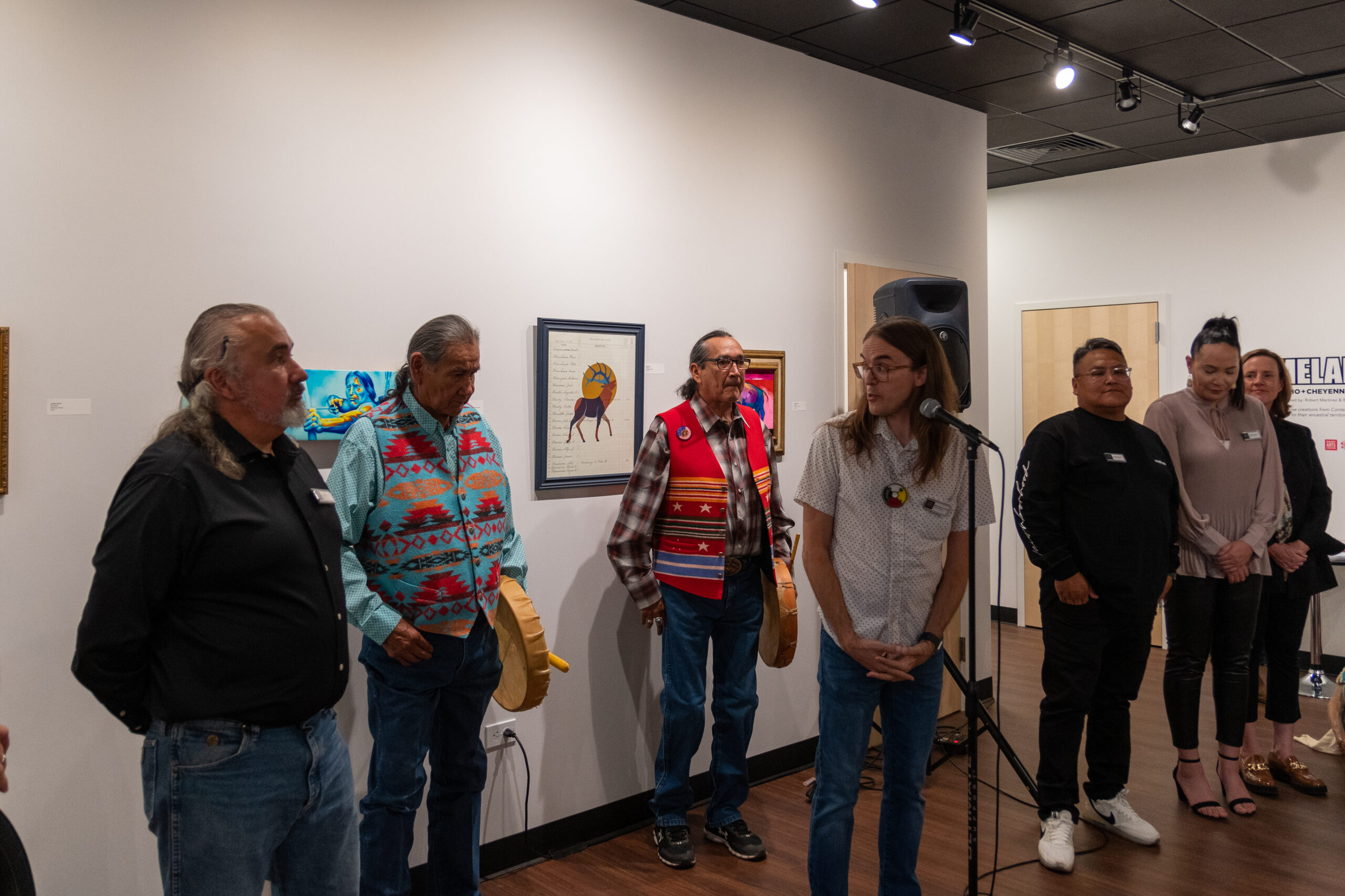
If you’ve attended a Boulder County stage production in recent years, you’ve likely heard a pre-show announcement about the history of the land beneath your feet. Formal recognition of the Indigenous peoples who lived here before white settlement have become a common fixture on the Front Range and across the country as institutions grapple with their place in the legacy of colonial violence and displacement.
Ojibwe playwright Marty Strenczewilk has heard plenty of these proclamations. While some critics dismiss the speeches as empty gestures, the managing director of the Boulder-based Creative Nations artist collective believes they can do more than just check a box.
“There’s good and bad to curtain speeches with land acknowledgments,” Strenczewilk says. “Sometimes they expect the Indigenous people to do it, which is extremely uncool because we have nothing to acknowledge. They’re really about driving the conversation. Are there crappy parts of it? Sure, but it serves as a good starting point.”
Sparking meaningful dialogue is central to the Indigenous art coalition’s inaugural First Storyteller’s Festival taking place Sept. 30 to Oct. 6. The showcase will feature five new works by Indigenous playwrights from around the country, performed live by Native actors.
While the staged readings take place at eTown Hall and the Dairy Arts Center in Boulder, a panel featuring the playwrights will be held at the Longmont Museum’s Stewart Auditorium on Oct. 3.
“The evening is an investigation of the complexities of telling Native stories,” says Justin Veach, curator of public programs and manager at the Stewart Auditorium.
Those complexities include everything from historical struggles against settler colonialism to modern identity crises, all informed by the cultural backgrounds of the artists. But Strenczewilk says the showcase is less about tackling these issues with fully formed works, and more about fine-tuning the pieces before they break out onto the stage.
“We wanted to create a festival for development, not production,” Strenczewilk says. “There are many incredible Native theaters, but what was missing was a development space where writers could revise and workshop their new plays.”
The festival comes two years after Creative Nations and the Dairy Arts Center entered into what Strenczewilk calls a “crucial” partnership. The arrangement provides the collective with a dedicated multi-use exhibition wing known as Sacred Space at the nonprofit arts center, along with funding and technical resources to carry out its mission.
“It gives us the freedom and resources to bring in Native playwrights, give them time to develop their work and run multiple readings,” Strenczewilk says. “If we want to see more Native plays performed in major regional theaters, we must improve the play development process.”
Strenczewilk and Creative Nations have big plans for the future. The collective intends to become its own nonprofit within the next three to five years. Strenczewilk believes independence will allow for expanded programming and partnerships. In the meantime, he hopes the upcoming festival will help to expand the new play pipeline and make Boulder a hub for Native work.
“We’re already in conversations with major theaters who are interested in hearing more about these plays,” Strenczewilk says. “And that’s the whole point, right? This isn’t the end; this is a middle point.”
ON STAGE: First Storyteller’s Festival. Sept. 30 through Oct. 6, Dairy Arts Center, 2590 Walnut St. and eTown Hall, 1535 Spruce St., Boulder. $10-$15 | Voices of Change: An Evening with Native American Playwrights. Oct. 3, Longmont Museum - Stewart Auditorium, 400 Quail Road. Free
* * *
What’s on the bill?
The public readings begin Oct. 1 at eTown Hall with New Year’s Purun by Justin P. Lopez (Mapuche), a coming-of-age story set in urban Chile. Taiel, 16, must master the traditional Purun dance to fulfill his role as a healer while also navigating the challenges of modern life and bullying.
Following Lopez’s 10-minute play, Steve Callahan (Osage) will present The Counting of the Heads, a family drama about identity. The work is a dramatization of the real-life love story between his Osage grandfather and German grandmother in 1906, during the first tribal census in Indian Territory.
“There is the hint of future oil wealth. There is hope for wealth from steam automobiles. There is rich Osage lore,” Callahan says. “Shall Will and Annie’s four children take the Osage way — or the White Man’s way?”
On Oct. 2 at the Dairy, Savage: The Unconquerable Wanda Savage, written by Nicolette Blount (Chickasaw) and Lindel Hart, the musical tells the story of a Chickasaw sharpshooter and silent film actress who defied social expectations in Hollywood during the Vaudeville era.
For a contemporary spin on Native stories, Embers Borne West by Maddox K. Pennington (Cherokee) on Oct. 5 at the Dairy tells a time-bending tale of two generations of a Cherokee family: Jay is a nonbinary 30-year-old listening to their ancestors who moved to Los Angeles a century before.
“[They] find themselves asking some of the same questions about Native identity and belonging: assimilation vs. adaptation, family and home,” Pennington says.
The festival also includes dibaajimo (s/he tells, tells a story) following Pennington’s reading. This is a showcase of work created by students and parents from the Boulder Valley School District’s American Indian Parent’s Council in the Dairy’s lobby.
Strenczewilk’s Pink Man or The Only Indian in the Roomthat evening is the final reading of the festival. The semi-autobiographical work explores the complications of childhood through the playwright’s own search for belonging as an Ojibwe kid.
“My mom’s side was heavily engaged with this Native part of their life, but I lived in this small racist town where there was a Confederate flag that hung on our locker,” Strenczewilk says. “The stories are my experience of trying to figure out what it meant to live not on one side of my identity or the other, but somewhere in the middle.”
